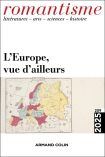
Romantisme n° 154 (4/2011)
Pour acheter ce numéro, contactez-nous
Recevez les numéros de l'année en cours et accédez à l'intégralité des articles en ligne.
The notion of an “animal society”, to translate the expression “ société animale”, an expression long used essentially as an analogy, gained considerable currency at the end of the 19th century thanks to Alfred Espinas’ work, Des Sociétés animales (1877) – a work of comparative psychology whose title is best rendered as Regarding Animal Societies. The expression is emblematic of the idea of a comparative science of living beings, and carries the promise of eliminating the brutal divide between animal and human. The popularity of this expression deserves to be understood in the light of Espinas’ philosophical struggle against the spiritualism then dominating French academia, which rejected anything even hinting at a continuum of living beings, and constituted consciousness as the defining human prerogative. But the expression was also to be rejected by the would-be sociologists of the time, in particular by Durkheim and his collaborators at the Année sociologique. Thus was sealed for a century at least Espinas’ failure to undermine the prevailing hierarchy of knowledge, and to make of animals a legitimate object of sociological enquiry.

